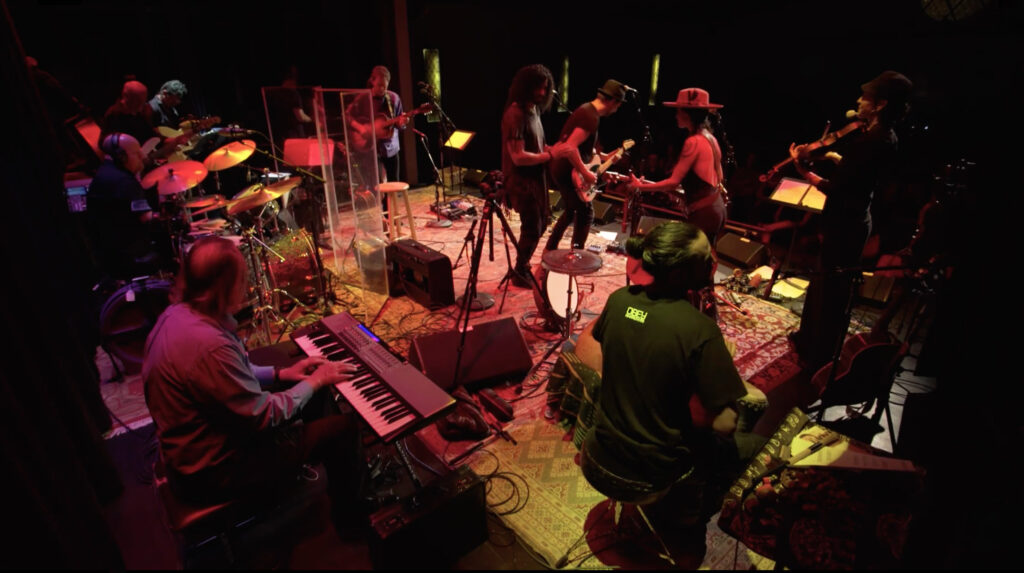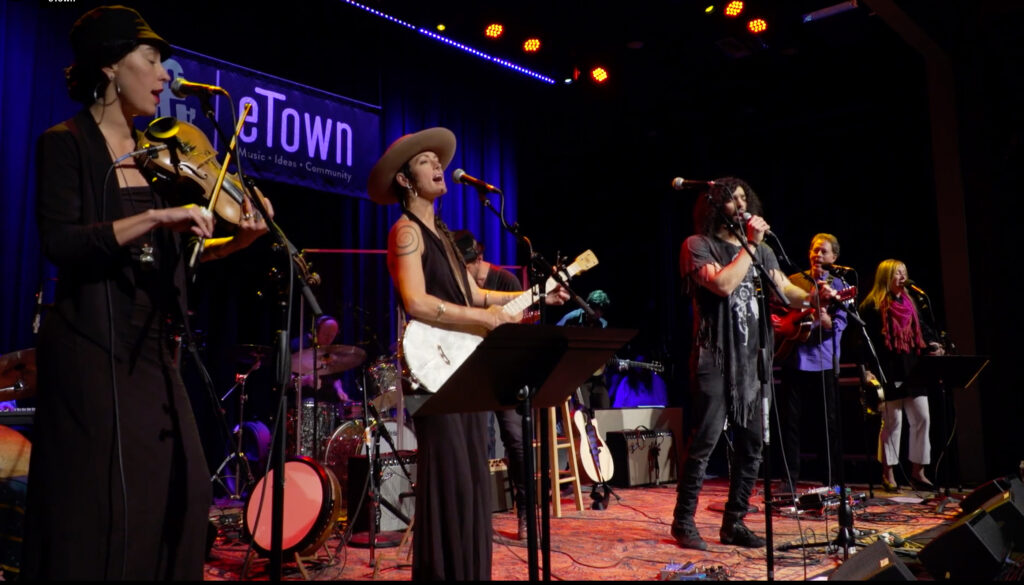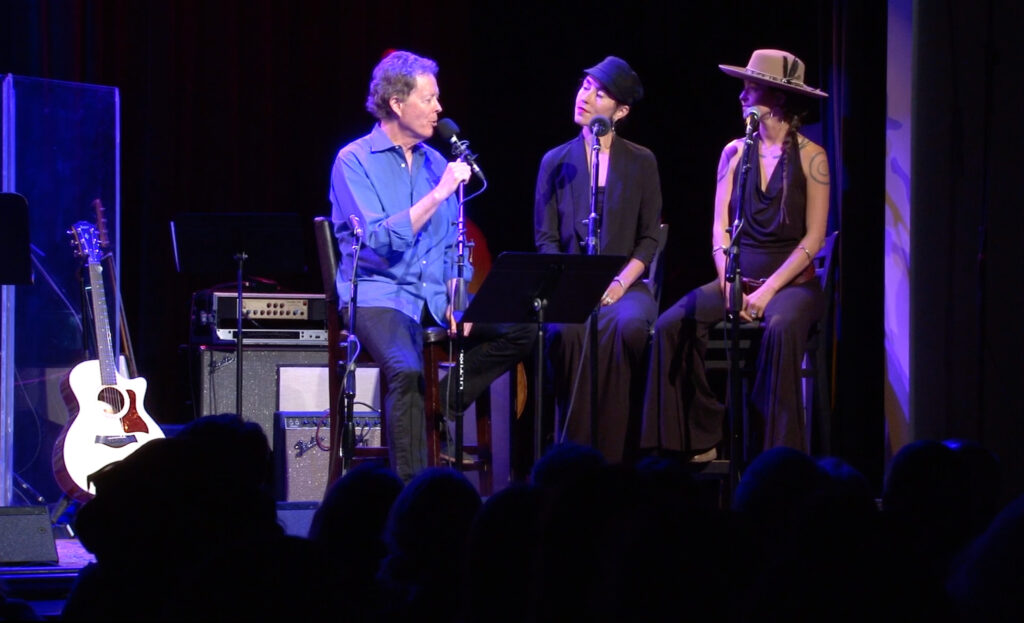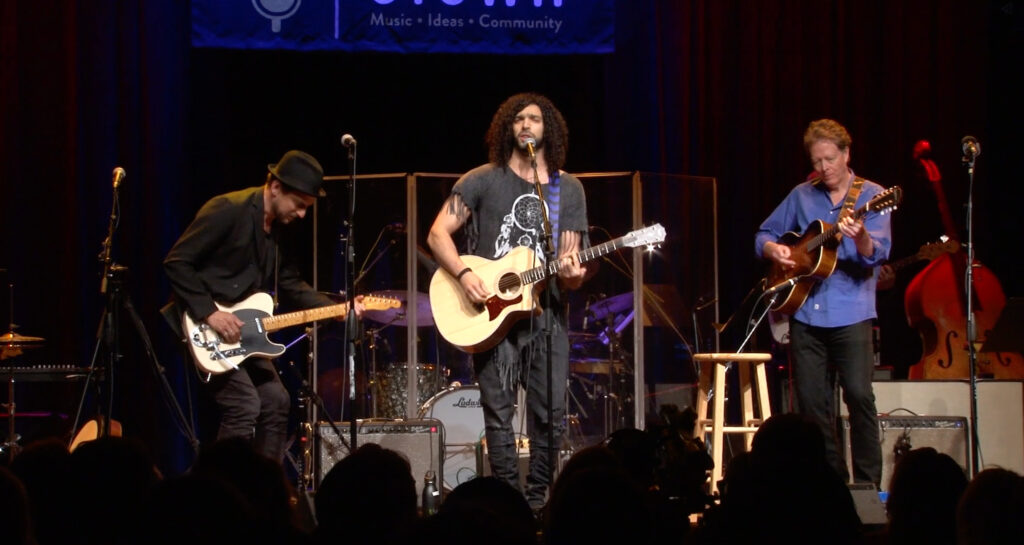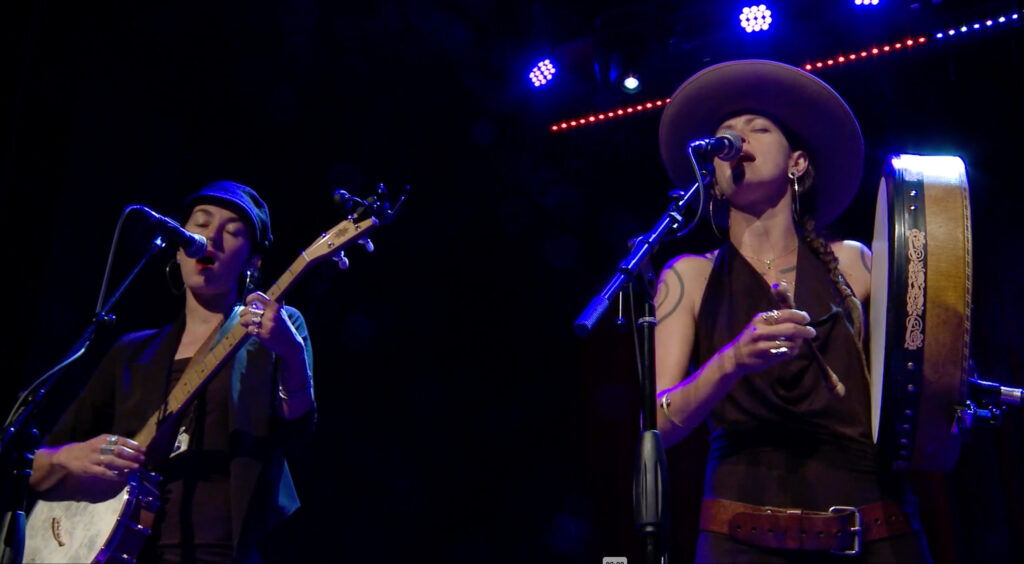This week we revisit a dynamic show featuring two musical acts that are countercultural icons in their own ways and in separate countries. American born sisters Leah Song and Chloe Smith and their band Rising Appalachia share their unique brand of “Hillbilly World Music” and chat about how they promote the slow movement in their touring practices. Now exiled in Sweden, Egyptian Ramy Essam travels the eTown to share the songs that led to his becoming the voice of the 2011 Egyptian revolution that overthrew an oppressive leader. Also with us is Joseph Teipel who shares his story about Re:Vision an organization dedicated to building community food independence in the Westwood neighborhood of Denver.
That’s all this week on eTown!
Rising Appalachia
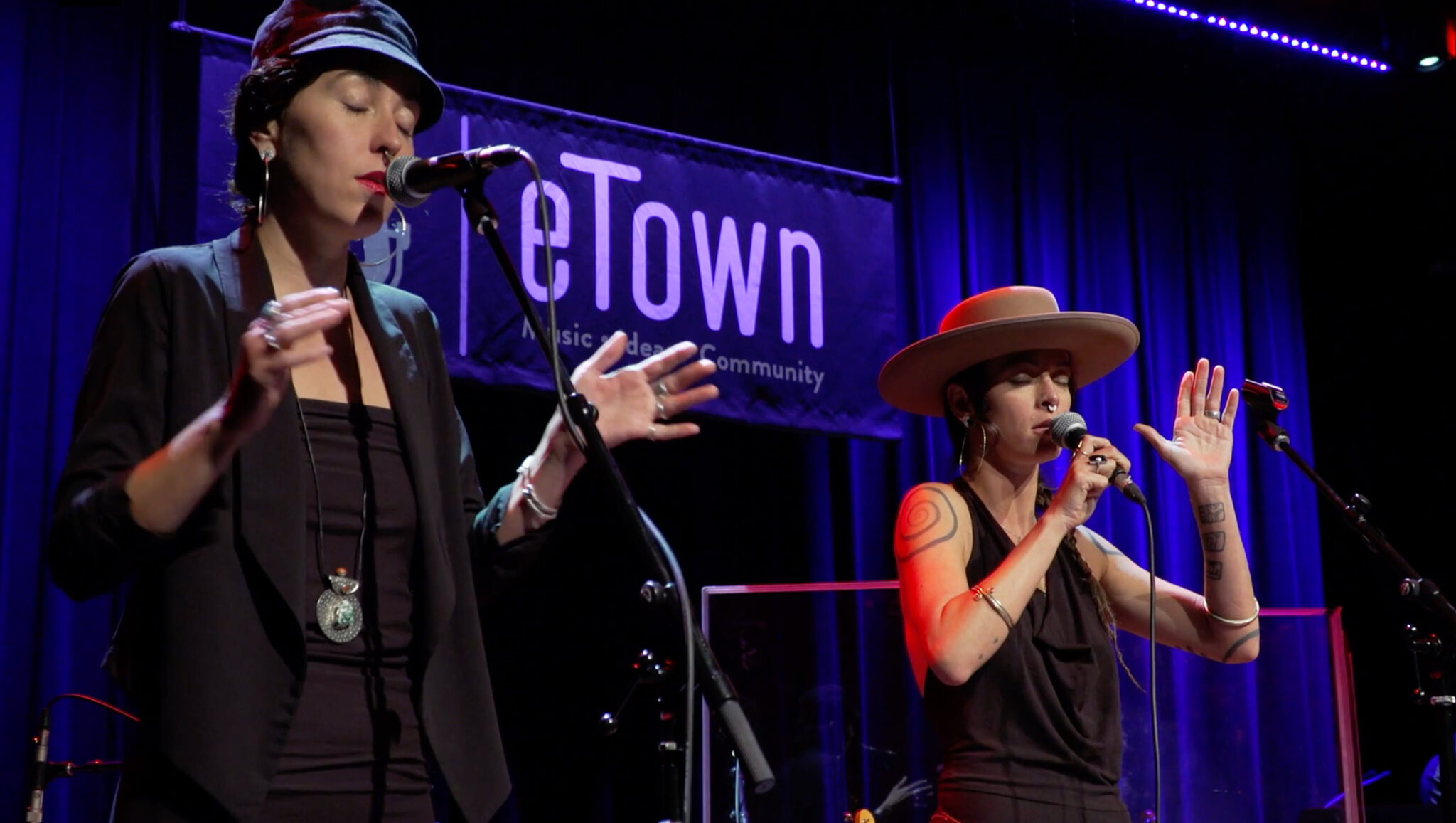
Live At Preservation Hall represents a full-circle moment for Rising Appalachia.
In 2007, Leah and Chloe Smith decamped to New Orleans from their hometown in downtown Atlanta. The mission was to deliver art in service to the rebirth of a city, in the wake of Hurricane Katrina. The sisters sought to assist in the process of healing and rebuilding, collaborating on restoration education and post-storm artistic offerings with the organization Alternate Roots.
Seduced by the royalty of NOLA culture— radiant even in the midst of such unimaginable loss, struggle and trauma—the young women put down their own roots and swiftly got to work. Nestled in the bosom of New Orleans’ vibrant musical village, they saw themselves as street-culture apprentices, discovering kindred souls while steadily finding their way as Rising Appalachia.
“The voice and songs of New Orleans will knock you off your feet. They strike you quick with an almost obsessive heartache and love,” reflects Chloe. “We basically never left. We lived there for seven years, soaking in the jazz and brass, the spirit of its people. Naturally, those sounds seeped into our music, as well as into our identity as Southerners.”
Rising Appalachia’s soulful folk-roots sound traces back to parents who prioritized culture and diversity, and to the grassroots music communities that dot the hills and valleys of the Deep South. Countless weekends spent at fiddle camps like the Swannanoa Gathering, immersed in what they affectionately call “Appalachian trance music.” Through thunderstorms and hot summer nights, firefly-chasing and bullfrog belting, they developed an affinity for the forests, groves and hidden treasures of rural Appalachia.
“Our mom and dad are folk fiddlers,” Leah elaborates. “Both have been playing in old-time jam circles since we were babies. There was music in our house five days a week. On weekends, fiddle camps and contra dances. Mom is a jazz pianist, too, even starting a gospel/Appalachian/jazz singing group with a dozen women who rehearsed at our home. In many ways, Rising Appalachia was predestined, an extension of the family tradition.”
Adjacent to those paternal influences was the raw realism of Atlanta’s kaleidoscopic ’90s rap underground, which served to strengthen the girls’ connection to the Southern metropolis they called home. “Chloe and I have always shared a deep love of urban storytelling,” Leah says. “We believe that hip-hop is a front-porch music, it’s one of our greatest contemporary folk traditions. We had these musical cultures swirling around us for our entire upbringing.”
Those disparate scenes first seeded Rising Appalachia’s unicorn sound. Before long, the women welcomed the voluminous talents of multi-instrumentalist David Brown and world percussionist Biko Casini. Each player wields an appropriately eclectic skillset, proven essential to the group’s sonic gumbo for more than a decade. Later, they added virtuosic fiddler/cellist Duncan Wickel, a prodigy from the same Appalachian summer camps of their youth.
Rising Appalachia places a laser focus on pertinent social justice issues. Both women identified as activists well before professional artisans. They consistently use their platform to activate, organize and support frontline justice work and community organizations. The messaging highlights local food issues, educates fans on feminism, the climate crisis, and prison industrial complex, among other crucial causes.
As they bore witness to New Orleans’ resolve, Leah and Chloe solidified their voice as grown women, and their embryonic songs came to life. Above the buzz of horses’ hooves and fortune-tellers, they cut their teeth busking in the French Quarter – just a few short blocks from the iconic Preservation Hall, a 19th-century Creole townhouse later transformed into a non-profit performance art space in 1961.
Preservation Hall brought musical traditions under the same roof before they were legally allowed to perform together. Hosting intimate acoustic concerts 350 nights per year for over half-a-century, Preservation Hall is a quintessential pilgrimage in the birthplace of Black American music.
In January 2021, with the pandemic in full swing neither Rising Appalachia nor Preservation Hall were staging events with live audiences. Instead, the band was invited to collaborate with the distinguished institution and produce a livestream concert. A medicinal balm broadcast to their fans around the globe, the lasting effects of that salve are preserved on the group’s latest release, Live at Preservation Hall.
Rising Appalachia’s reverence for all things NOLA can be heard from within the hallowed jazz cathedral. Leaning heavily into a Crescent City swoon, the quintet is ably assisted by a pair of beloved local luminaries: Aurora Nealand (clarinet, accordion) and Preservation Hall Jazz Band’s Branden Lewis (trumpet). The regional accouterments lend a certain authenticity and panache to seminal selections like opener “A Closer Walk With Thee”, and treasured traditional “St. James Infirmary”, a longtime setlist favorite.
The concert is brimming with full band dynamics, and explores the deeper annals of Rising Appalachia’s NOLA-centric songbook. “Indigo Dance” (Leylines, 2019) is a debutante ditty that nods to the city that care forgot. The swaggering “Downtown” (Filthy Dirty South, 2012) was conceived as Leah eluded the omnipresent parish potholes while biking through the Marigny. “River Mouth” (Wider Circles, 2015) was hand-crafted amongst dear friends at the base of the Mississippi, where the river meets the Gulf of Mexico. Embossed in subtle squeezebox and hymnal harmonies, lonesome love ballad “The Long Haul” (Filthy Dirty South) was similarly born on these Bayou waters.
Mined from 2020’s surprise LP The Lost Mystique of Being in the Know, both “Catalyst” and “Silver” unspool rather exquisitely to fill the sacred space. The gospelized “Shed Your Grace” (Leylines) struts down the Quarter’s cobblestone streets in joyful gratitude. “Resilient” (Leylines) remains Rising Appalachia’s magnum opus protest song. The rallying cry is revealed with an arrangement rich in nuanced instrumentation; the group offering a sublime reading unique to the momentous occasion.
Eschewing established industry norms, Leah and Chloe Smith have followed invitation and intuition to independently forge their own path. Fifteen years and seven studio albums into an ambitious adventure that has already taken these medicine women around the world, Rising Appalachia continues spreading musical catharsis with an iridescent elixir of global soul.
B.Getz – Upful Life
Oct 2022
Ramy Essam
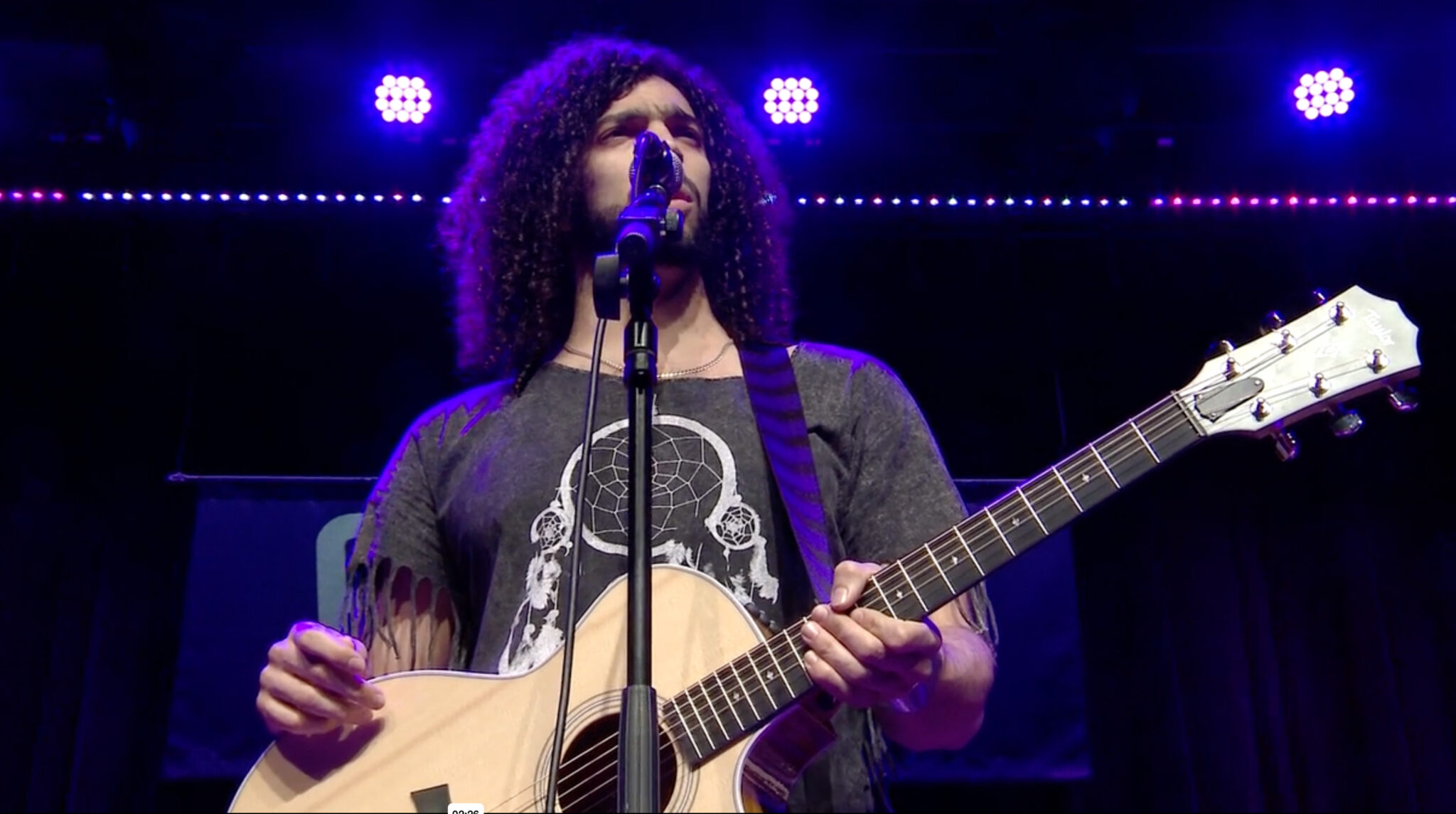
Rock artist and human rights defender Ramy Essam is considered to be one of the loudest voices of today. His resilient journey from the hub of the Egyptian revolution to the international stages has included viral hits and awards as well as moments of struggle. With his background in being the voice of the streets of his country, Ramy today stands for social justice and human rights worldwide.
Ramy’s music is rock with Egyptian flavor and hiphop influences, inspired by hard rock and grunge. He sings in both Egyptian Arabic and English.
Said to be a beacon of uncommon bravery in the Middle East, Ramy Essam exploded into international fame in the Egyptian revolution starting in 2011 as his songs spread like wildfire among the demonstrators. During the height of the uprising, Ramy performed in front of hundres of thousands of people in Tahrir Square and became the voice of the revolution. His song Irhal demanding resignation of then-ruler Hosni Mubarak is referred to as the real anthem of the revolution. Irhal was listed as #3 Song That Changed History by Time Out Magazine.
In the revolution I was born again. The struggle became the purpose of my life. -Ramy Essam
But fame came with a heavy price. In 2011, Ramy experienced brutal torture and arrests. Since late 2013 his songs were banned, and he was forbidden from performing publicly.
Ramy has lived in exile in Sweden and Finland since 2014, e.g. working in artist residencies hosted by ICORN and Artists At Risk. In addition to touring worldwide and releasing music, Ramy has performed in theatre pieces gaining five stars reviews internationally.
Ramy’s videos have been viewed over 30 million times across different platforms. Lessa Bahinlha has reached nearly 18 million views on YouTube. One of Ramy’s biggest hits is Segn Bel Alwan (feat. Malikah), a song about imprisoned women and gender equality, which has over 8 million views on YouTube.
In 2017, Ramy and PJ Harvey released song The Camp with music video built from footage by photographer Giles Duley. The artists donate all net profits from the track to Beyond Association, a Lebanese NGO which provides access to education and support for displaced children in the Bekaa Valley of Lebanon.
Music is the strongest peaceful weapon
in the world. -Ramy Essam
In February 2018 Ramy released a song and music video Balaha aiming to raise discussion on the violence, oppression and corruption in Egypt. The video went viral with over millions of views in just days, causing controversy. The lyricist of the song, poet Galal El-Behairy and director of the video, filmmaker Shady Habash were arrested. In 2018 Galal was sentenced to three years in jail. In May 2020 the Shady died in custody.
Ramy has received plenty of awards for his music and activism. In May 2021 Ramy was awarded with the Rambaldi Prize 2021 in Barcelona, established by Cose di Amilcare Association and in 2019, Premio Grup Yorum Award was honored by Italian Club Tenco / Premio Tenco. In 2019, Ramy was awarded the Václav Havel Prize of Creative Dissent by the Human Rights Foundation. Watch Ramy’s speech >
